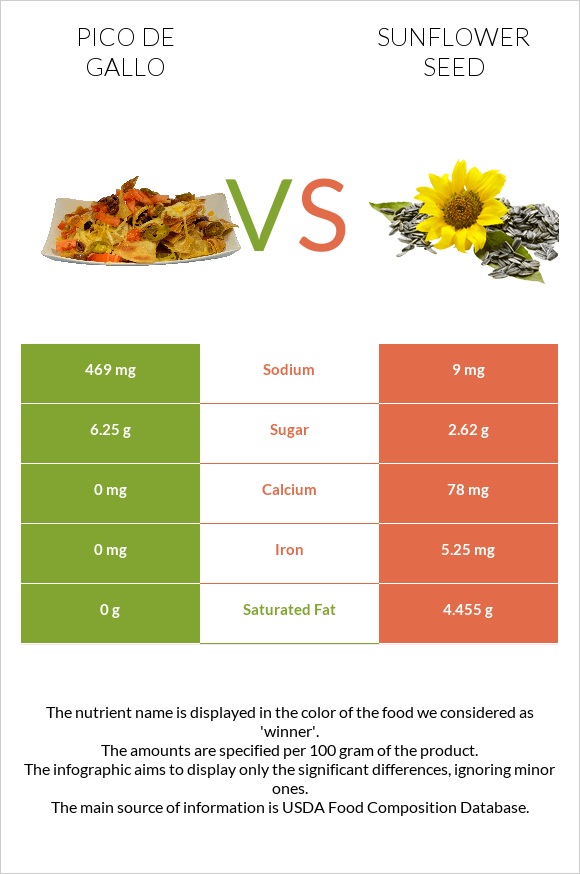Pico de gallo vs. Sunflower seeds — In-Depth Nutrition Comparison
Compare
Summary of differences between pico de gallo and sunflower seeds
- Pico de gallo has more vitamin A; however, sunflower seeds are higher in iron and calcium.
- Sunflower seeds cover your daily need for iron, 66% more than pico de gallo.
- Pico de gallo has 52 times more sodium than sunflower seeds. While pico de gallo has 469mg of sodium, sunflower seeds have only 9mg.
These are the specific foods used in this comparison PACE, Pico De Gallo and Seeds, sunflower seed kernels, dried.
Infographic

Infographic link
Mineral Comparison
Mineral comparison score is based on the number of minerals by which one or the other food is richer. The "coverage" charts below show how much of the daily needs can be covered by 300 grams of the food.
| Contains more CalciumCalcium | +∞% |
| Contains more IronIron | +∞% |
| Contains less SodiumSodium | -98.1% |
Vitamin Comparison
Vitamin comparison score is based on the number of vitamins by which one or the other food is richer. The "coverage" charts below show how much of the daily needs can be covered by 300 grams of the food.
| Contains more Vitamin CVitamin C | +171.4% |
All nutrients comparison - raw data values
| Nutrient |  |
 |
DV% diff. |
| Vitamin E | 35.17mg | 234% | |
| Copper | 1.8mg | 200% | |
| Polyunsaturated fat | 23.137g | 154% | |
| Vitamin B1 | 1.48mg | 123% | |
| Vitamin B6 | 1.345mg | 103% | |
| Selenium | 53µg | 96% | |
| Phosphorus | 660mg | 94% | |
| Manganese | 1.95mg | 85% | |
| Fats | 0g | 51.46g | 79% |
| Magnesium | 325mg | 77% | |
| Iron | 0mg | 5.25mg | 66% |
| Folate | 227µg | 57% | |
| Vitamin B3 | 8.335mg | 52% | |
| Monounsaturated fat | 18.528g | 46% | |
| Zinc | 5mg | 45% | |
| Protein | 0g | 20.78g | 42% |
| Fiber | 8.6g | 34% | |
| Calories | 31kcal | 584kcal | 28% |
| Vitamin B2 | 0.355mg | 27% | |
| Vitamin B5 | 1.13mg | 23% | |
| Sodium | 469mg | 9mg | 20% |
| Saturated fat | 0g | 4.455g | 20% |
| Potassium | 645mg | 19% | |
| Choline | 55.1mg | 10% | |
| Calcium | 0mg | 78mg | 8% |
| Carbs | 9.38g | 20g | 4% |
| Vitamin C | 3.8mg | 1.4mg | 3% |
| Net carbs | 9.38g | 11.4g | N/A |
| Sugar | 6.25g | 2.62g | N/A |
| Vitamin A | 3µg | 0% | |
| Tryptophan | 0.348mg | 0% | |
| Threonine | 0.928mg | 0% | |
| Isoleucine | 1.139mg | 0% | |
| Leucine | 1.659mg | 0% | |
| Lysine | 0.937mg | 0% | |
| Methionine | 0.494mg | 0% | |
| Phenylalanine | 1.169mg | 0% | |
| Valine | 1.315mg | 0% | |
| Histidine | 0.632mg | 0% | |
| Omega-3 - EPA | 0.014g | N/A |
Macronutrient Comparison
Macronutrient breakdown side-by-side comparison
Protein:
0 g
Fats:
0 g
Carbs:
9.38 g
Water:
88 g
Other:
2.62 g
Protein:
20.78 g
Fats:
51.46 g
Carbs:
20 g
Water:
4.73 g
Other:
3.03 g
| Contains more WaterWater | +1760.5% |
| Contains more ProteinProtein | +∞% |
| Contains more FatsFats | +∞% |
| Contains more CarbsCarbs | +113.2% |
| Contains more OtherOther | +15.6% |





